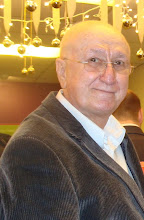I'm sitting totally encased in a plastic booth, sealed from the outside world, desperately trying to suck air through a tube about the diameter of the hose on a vacuum. But the opening in the tube has been closed and, although I am trying as hard as I can, no air is coming through.
"Breathe--breathe--breathe!" the technician is yelling at me through the speaker in the booth.
But no matter how hard I suck, no air flows. No air can flow, the damper has been closed. The muscles in my cheeks and upper throat swell with the effort, my eyes feel like they are about to pop out of my head!
"Breathe--breathe--breathe!" the techie's voice urges!
And then she flicks a switch, the damper opens and the air begins to flow again and gradually my panting returns to normal breathing.
"Excellent," the technician tells me. "Now we just have to do this one more time for comparison."
I'm undergoing a breathing test at Princess Margaret Hospital (PMH) prior to surgery and this is the last of tests I need to undergo to determine the fitness of my lungs for a six to eight hour operation. As part of the surgery they will have to collapse one of my lungs and need to know the likelihood of re-inflating it before they begin. I've been at it for nearly half an hour now. In the next booth a man undergoing the same series of tests is wracked with coughing every time he attempts to breathe deeply, or exhale fully. I'm not sure how I've been doing, but I think I've done better than that.
We repeat the test one more time and then I'm done and go out to meet Linda in the waiting room. She looks harrowed and frightened. I tell her about the poor man in the next booth and tears suddenly well up at the corner of her eyes.
"I thought that was you coughing," she says. "I could hear the coughing all the way out here in the waiting room. You don't know how frightened that made me. I thought that was you!"
We hug, and Linda starts to laugh with relief. It was one more scary thing in a month of even scarier things, and we move on to the heart echo test down on the 5th floor. A German technician who looks remarkably like Santa Claus (or should that be Klaus?) calls my name. I go into an examining room and remove my shirt while he goes over my chest with a wand periodically having me hold my breath, still again. After all the breathing tests I've just done, I am getting very good at holding my breath.
And then its off to meet Dr. Darling from PMH who will be doing my surgery, once chemo and radiation are over. But first one of her nurses recruits me for still another study.
I am among the few for whom there is no environmental cause for my esophageal cancer. This rare form of cancer is predominately contracted by heavy smokers or heavy drinkers. I am neither. I'm a rarity within a rarity, an anomaly they are anxious to study. If it's not the environment, is it something about my genetic make up that has led me here? We are left with a seven page questionnaire to fill out and the nurse comes in with enough vials for the genetic study to remove half my blood supply.
Then Dr. Darling's assistant has the unpleasant task of telling me everything that could go wrong with the surgery, so my consent will be fully informed. The list is long and scary. Including the possibility that my stomach could die during the process, or that my throat could keep healing over and I would need constant dilatations throughout the rest of my life.
I am hearing what he is saying, but my ability to track was halted by a point he made at the beginning of our meeting. He had begun by telling me something that had never been said to me since this entire process began. It has stunned me and shaken me to my core.
"If your cancer responds well to the chemotherapy," he had casually mentioned. "And we just have a mopping up to do, your chances for a full recovery are excellent."
Your chances for a full recovery are excellent. Excellent!
Can we hear that word one more time---EXCELLENT!!!
The word distracts me. It plays like the most beautiful music I have ever heard. I want to leap to my feet and run down the corridors of the hospital yelling "Excellent!! Excellent!!!!!"
"Barry, are you alright?" Linda asks, noting my unusual silence. If she could only hear all the noise going on in my head: marching bands, cheerleaders cavorting, 21 gun salutes going off, ticker tape pouring down, cheering throngs....
I nod, not trusting myself to speak. Fearing I will start laughing uncontrollably.
The initial odds we were told for this aggressive form of cancer were only 15% survival at the end of a five year period. The more honest flip side to that statistic is that 85% of those with esophageal cancer don't make it to the 5 year mark. Don't even come close. In one of the papers Dr. Darling wrote ten years ago, she called the survival rate "abysmal".
"Excellent" was not a term I had ever heard. That I ever expected to hear. Especially not specifically directed at me.
By now Dr. Darling herself had arrived, a bespectacled forty year old in a dark blue business suit, and she was chatting about the course of the operation. That my esophagus would be entirely removed and my stomach cut in half with one half stretched up to meet my throat. That I would no longer have a sphincter to separate my stomach from my esophagus. My stomach would now be a long open tube stretching from my throat to my bowel with a small pocket at the bottom for digesting small portions of food. That I would never again be able to lay flat without stomach acid pouring into my mouth.
But I would live.
And if my cancer responded well to chemo, my chances of a full recover were excellent.
My first session of Chemo is scheduled for May 12th.
But I have another CT Scan, a PET scan, another Gastroscopic examination, a visit with the medical Oncologist and even more blood to give to the genetic study before I get there.
Lip-Smacking Good
22 hours ago



